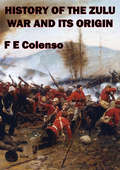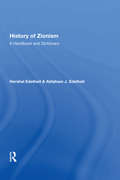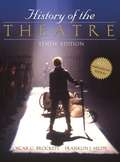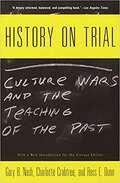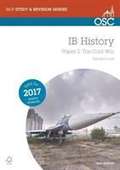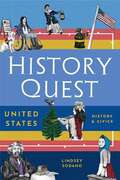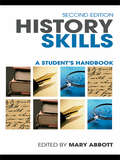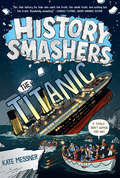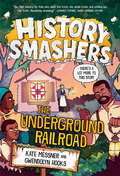- Table View
- List View
History Of The War In The Peninsular And In The South Of France, From The Year 1807 To The Year 1814 – Vol. III (History Of The War In The Peninsular And In The South Of France, From The Year 1807 To The Year 1814 #3)
by General William Francis Patrick Napier K.C.B.A masterful, epic account of the Spanish Ulcer that drained Napoleon's resources and played a pivotal role in the end of his domination of Europe.The author served with distinction in the actions of the Light Division, such as the epic march to Talavera, the battles of Fuentes d’Oñoro, Salamanca, Nivelle, Orthes and Toulouse. He left the service a General and Knight Commander of the Order of Bath. Napier’s History would rank as the most important history to be written by an actual participant, and was as controversial with his countrymen as amoung his contemporaries on the Continent. In this third volume (Mid-1810 to Sept 1811), covers the third French invasion of Portugal under Massena, although he outnumbers his British and Portuguese opponents is beset by problems, not the least of which are his sub-ordinates who are loath to obey him. As he drives into Portugal he is given a bloody nose at the battle of Busaco, and a horrible surprise at the lines of Torres Vedras, which are impregnable. Forced to retire through devastated countryside, culminating in the battle of Fuentes D’Oñoro as he tries to relieve the garrison of Almeida, which had been left behind. All in all the French would never set foot in force again in Portugal and Wellington’s strategies would be vindicated.However Napier put these events in their proper context, the seemingly inexorable march to an Allied victory is far from the reality of the situation; an expedition to Fuengirola under Lord Blayney is routed, British expeditions along the Eastern coast of Spain are foiled and in the case of Taragona, it falls in sight of the force sent to aid it. The Regency of Portugal and the court in Brazil intrigue and cause trouble and strife, the Spanish troops start to rack up some small scale victories but are handled and led badly in most cases. The detached corps of Marshal Beresford fights the bloody battle Albuera, Napier is none too kind in his criticisms of his actions.
History Of The War In The Peninsular And In The South Of France, From The Year 1807 To The Year 1814 – Vol. III (History Of The War In The Peninsular And In The South Of France, From The Year 1807 To The Year 1814 #6)
by General William Francis Patrick Napier K.C.B.A masterful, epic account of the Spanish Ulcer that drained Napoleon's resources and played a pivotal role in the end of his domination of Europe.<P><P> The author served with distinction in the actions of the Light Division, such as the epic march to Talavera, the battles of Fuentes d’Oñoro, Salamanca, Nivelle, Orthes and Toulouse. He left the service a General and Knight Commander of the Order of Bath. Napier’s History would rank as the most important history to be written by an actual participant, and was as controversial with his countrymen as amoung his contemporaries on the Continent. In this third volume (Mid-1810 to Sept 1811), covers the third French invasion of Portugal under Massena, although he outnumbers his British and Portuguese opponents is beset by problems, not the least of which are his sub-ordinates who are loath to obey him. As he drives into Portugal he is given a bloody nose at the battle of Busaco, and a horrible surprise at the lines of Torres Vedras, which are impregnable. Forced to retire through devastated countryside, culminating in the battle of Fuentes D’Oñoro as he tries to relieve the garrison of Almeida, which had been left behind. All in all the French would never set foot in force again in Portugal and Wellington’s strategies would be vindicated.<P> However Napier put these events in their proper context, the seemingly inexorable march to an Allied victory is far from the reality of the situation; an expedition to Fuengirola under Lord Blayney is routed, British expeditions along the Eastern coast of Spain are foiled and in the case of Taragona, it falls in sight of the force sent to aid it. The Regency of Portugal and the court in Brazil intrigue and cause trouble and strife, the Spanish troops start to rack up some small scale victories but are handled and led badly in most cases. The detached corps of Marshal Beresford fights the bloody battle Albuera, Napier is none too kind in his criticisms of his actions.
History Of The War In The Peninsular And In The South Of France, From The Year 1807 To The Year 1814 – Vol. IV (History Of The War In The Peninsular And In The South Of France, From The Year 1807 To The Year 1814 #4)
by General William Francis Patrick Napier K.C.B.A masterful, epic account of the Spanish Ulcer that drained Napoleon's resources and played a pivotal role in the end of his domination of Europe.<P><P> The author served with distinction in the actions of the Light Division, such as the epic march to Talavera, the battles of Fuentes d’Oñoro, Salamanca, Nivelle, Orthes and Toulouse. He left the service a General and Knight Commander of the Order of Bath. Napier’s History would rank as the most important history to be written by an actual participant, and was as controversial with his countrymen as amoung his contemporaries on the Continent.<P> In this fourth volume (end-1811 to December 1812), covers the major Anglo-Portuguese offensive of 1812, whilst Napoleon embarks on his disastrous campaign to Russia, Wellington struck into mainland Spain. Although hampered by numerous supply issues, not least caused by the Spanish government or lack thereof, Wellington drove through the southern corridor between Portugal and Spain, taking the key fortresses of Cuidad Rodrigo and Badajoz. The last siege was a particularly bloody affair and cost Wellington a great many soldiers ending in an infamous orgy of lotting. Wellington manoeuvred to keep his prizes whilst Marmont with a similarly sized French army sought to cut him off from Portugal. These movement culminated in the battle of Salamanca, which was described at the time by a French officer, as the 'beating of forty thousand men in forty minutes.'. It was a masterpiece of timing and skill, and is widely regarded as Wellington’s masterpiece.<P> Despite all of the favourable items in the Allies favour, the concentration of the French armies led to the abandonment of Madrid after a brief period of occupation by Wellington’s troops, and the futile attempt to lay siege to Burgos. The Spanish and Anglo-Sicilian attempts in the eastern provinces ended in failure and in some cases ignominy. Much further fighting lay ahead before the French would be ejected from the Peninsular.
History Of The War In The Peninsular And In The South Of France, From The Year 1807 To The Year 1814 – Vol. V (History Of The War In The Peninsular And In The South Of France, From The Year 1807 To The Year 1814 #5)
by General William Francis Patrick Napier K.C.B.A masterful, epic account of the Spanish Ulcer that drained Napoleon's resources and played a pivotal role in the end of his domination of Europe.<P><P> The author served with distinction in the actions of the Light Division, such as the epic march to Talavera, the battles of Fuentes d’Oñoro, Salamanca, Nivelle, Orthes and Toulouse. He left the service a General and Knight Commander of the Order of Bath. Napier’s History would rank as the most important history to be written by an actual participant, and was as controversial with his countrymen as amoung his contemporaries on the Continent.<P> In this fifth volume (early 1813 to December 1813), Napier follows the Allied forces in their march to the French frontier and beyond. As Napoleon attempts to recover from the shattering failure of the 1812 Russian campaign and regain the initiative in Germany, the Duke of Wellington’s army, British, Portuguese and Spanish, begins to assert a dominance over their French opponents in the Peninsular. Despite further political manoeuvring the Spanish and with the Regency in Portugal, Wellington sent his army of a brilliant series of outflanking moves, culminating in the crushing of the French armies at Vitoria. Although he was enabled by this victory to push to the French frontier, he was left with two sieges at Pamplona and St Sebastian behind his lines,and a re-organized French army under Soult to his front. Eventually defeating the French offensive designed to relieve Pamplona, despite some less than spectacular performances by some of his subordinates, Wellington was able to invade France proper. A number of battles such as St. Pierre, and the Nivelle, all allied successes, resulted in a proper push toward final victory.<P> Napier also covers the events in other parts of Spain, where the very capable Marshal Suchet was able to fight off a number campaigns in Catalonia or aiming for Catalonia, despite the British command of the seas.
History Of The Zulu War And Its Origin (Cambridge Library Collection - Naval And Military History Ser.)
by Frances Colenso Edward DurnfordThe Zulu War-by possibly its most authentic historians.Most written histories intend to be accurate, but they often suffer from the bias of perspective, and whilst this history of the Anglo-Zulu War is no exception, it is exceptional in that it is decidedly not a view of the conflict from an Imperial British standpoint. Francis Colenso was the daughter of Bishop Colenso, whose Bishopric included Zululand at the time of the war. She knew the Zulu nation well, had an affection for it and in company with her father was an ardent advocate in its cause. She was well aware of the many shameful calumnies perpetrated against it by the British including the bringing about of the war of 1879 itself. This history, written by an author who was on the spot, was originally published very shortly after the events themselves took place. It provides a very different view, far removed from a story of Imperial glory or folly. Ultimately the traditional Zulu way of life was destroyed by the war and the injustice and tragedy of that is painfully elaborated in these pages. 'Fanny' Colenso had a close personal relationship with Colonel Anthony Durnford, who fell at Isandlwana and who became one of Lord Chelmsford's scapegoats for the disaster. For the military aspects of her history she called upon the assistance of Durnford's brother, Edward-also a soldier-to provide vital expertise, credibility, accuracy and authority. This is the first and possibly the most important history of the Zulu War and the events that bought it about and is an essential component of any library of the history of South Africa.
History Of World Civilisation
by Prof. N. JeyapalanThis book lets the readers to know all the cultural and economical status of all the countries in the world.
History Of Zionism: A Handbook And Dictionary
by Hershel EdelheitThis handbook and dictionary aims to provide the reader with a general overview of Zionist history and historiography, to tabulate all data on Zionism, and to gather in one source as many terms dealing directly or indirectly with Zionism and Jewish nationalism as possible.
History Of the Theatre (Tenth Edition)
by Oscar G. Brockett Franklin J. HildyKnown as the "bible" of theatre history, Brockett and Hildy's History of the Theatre is the most comprehensive and widely used survey of theatre history in the market. This 40th Anniversary Edition retains all of the traditional features that have made History of the Theatre the most successful text of its kind, including worldwide coverage, more than 530 photos and illustrations, useful maps, and the expertise of Oscar G. Brockett and Franklin J. Hildy, two of the most widely respected theatre historians in the field. As with every edition, the text reflects the current state of knowledge and brings the history of theatre up to the present. This tenth edition continues to provide the most thorough and accurate assessment of theatre history available.
History On Trial: Culture Wars And The Teaching Of The Past
by Gary Nash Charlotte Crabtree Ross DunnIn History on Trial, authors Gary B. Nash, Charlotte Crabtree, and Ross E. Dunn examine the controversy and criticism over how our nation's history should be taught, culminating in the debate about National History Standards. The book chronicles a media war spearheaded by conservatives from National Endowment for the Humanities veteran Lynne Cheney to Rush Limbaugh, posing questions with regard to history as it relates to national identity. What, the authors ask, is our objective in teaching history to children? Is the role of schools, textbooks, and museums to instill patriotism? Do we revise and reinterpret the past to tell stories that reflect present-day values? If so, who should articulate these values? Wonderfully clear, timely in its intentions, History on Trial provides a thoughtful account of the ways in which Americans have, since the beginning of the Republic, perceived and argued about our past.
History Quest: United States
by Lindsey SodanoHistory United States is a secular homeschool curriculum covering the history and civics of the United States from the 1500s to the early 21st century. Because it is secular, the text presents religious beliefs from this period not as factual accounts, but as relevant sources and perspectives to be considered through a historical lens. Designed as a read-aloud for upper elementary-age children, an independent read for older students, or a journey of thrilling stories to be shared during family story time, this main text of the History United States curriculum presents an immersive study of U.S. history and civics in an engaging and memorable format. Used alongside the History United States Study Guide and other recommended resources, your students will learn about the ideas, conflicts, inventions, and individuals that shaped the United States (and the world) and take their first step in a life-long quest to explore and appreciate history.
History Skills: A Student's Handbook
by Mary AbbottDegree-level history is characterized not only by knowledge and understanding of the human past, but by a battery of skills and qualities which are as directly applicable to employment as to professional postgraduate training or academic research. History Skills gives frank and practical help to students throughout their university course with advice on: research methods taking notes participating in class coursework examinations the dissertation. Designed as a guide to success, the book helps to develop the critical skills that students need to get the most out of their course. This second edition has been thoroughly updated to take into account digital resources and the benefits and risks associated with online research. New chapters on the first-year experience and employability help students to adjust to the way history is taught at university and explore the opportunities available to them after graduating. Offering an unrivalled ‘insider’s view’ of what it takes to succeed, History Skills provides the comprehensive toolkit for all history students.
History Smashers: Christopher Columbus and the Taino People (History Smashers #8)
by Kate Messner Jose BarreiroMyths! Lies! Secrets! Uncover the hidden truth about Christopher Columbus, and learn all about the Taino people. Perfect for fans of the I Survived books and Nathan Hale's Hazardous Tales.In 1492, Christopher Columbus sailed across the ocean and discovered America. Right? WRONG! Columbus never actually set foot in what is now the United States. His voyages took him to islands in the Caribbean and along the coast of South America. The truth is, when Columbus first arrived, Indigenous peoples, including the Taino, had been living there for thousands of years, raising their families, running their societies, and trading with their neighbors. He didn&’t &“discover&” the lands at all! And his name? Not even really Christopher Columbus! Cowritten by bestselling author Kate Messner and our country&’s premier Taino scholar, this fascinating addition to the series is the one that teachers have been asking for and that kids need to read.Discover the nonfiction series that demolishes everything you thought you knew about history. Don&’t miss History Smashers: The Mayflower, Women's Right to Vote, and Pearl Harbor.
History Smashers: Earth Day and the Environment (History Smashers)
by Kate MessnerMyths! Lies! Recycling scams? Discover the real story behind the first Earth Day celebration and some of the biggest US climate catastrophes--and their solutions! Don't miss the award-winning History Smashers series as they get to the truth on the biggest environmental fibs!In April 1970, twenty million people grabbed their rakes, gloves, and recycling bins to celebrate the first Earth Day. Since that environmental kickoff, nature has never been in better shape. RIGHT?WRONG! The real deal is a bit muddier than that. It&’s true that the first Earth Day encouraged people around the globe to clean up their act when it came to the environment. But activists have been working for centuries to save the planet! Native people across the world developed sustainable farming practices, women in eighteenth-century India stood up to protect trees, and amateur scientist Eunice Foote discovered the science behind global warming all the way back in the 1850s!Join the History Smashers team to bust history's biggest misconceptions and figure out what in the world really went down before (and after!) the first Earth Day—and how you can join the fight to protect the environment.Ready to bust new myths? Check out more titles in the History Smashers series: The Mayflower • Plagues & Pandemics • The Titanic • The Underground Railroad • The Salem Witch Trials
History Smashers: Pearl Harbor (History Smashers)
by Kate MessnerMyths! Lies! Secrets! Uncover the hidden truth behind the infamous Pearl Harbor attack with beloved educator/author Kate Messner. The fun mix of sidebars, illustrations, photos, and graphic panels make this perfect for fans of I Survived! and Nathan Hale's Hazardous Tales.On December 7, 1941, the Japanese launched a completely unpredictable attack on the U.S. Navy base at Pearl Harbor, Hawaii. Right? Well, that's not quite the real deal. Some military experts had suggested that Pearl Harbor was a likely target. There were other warning signs, too, but nobody paid much attention. From the first wave of the Japanese bombers to the United States' internment of thousands of Japanese Americans, acclaimed author Kate Messner smashes history by exploring the little-known truths behind the story of Pearl Harbor and its aftermath.Don't miss History Smashers: The Mayflower and Women's Right to Vote
History Smashers: Plagues and Pandemics (History Smashers)
by Kate MessnerMyths! Lies! Secrets! Uncover the hidden truth about history's pandemics, from the Black Death to COVID-19. Perfect for fans of I Survived! and Nathan Hale's Hazardous Tales.During the Black Death in the 14th century, plague doctors wore creepy beaked masks filled with herbs. RIGHT?WRONG! Those masks were from a plague outbreak centuries later--and most doctors never wore anything like that at all! With a mix of sidebars, illustrations, photos, and graphic panels, acclaimed author Kate Messner delivers the whole truth about diseases like the bubonic plague, cholera, smallpox, tuberculosis, polio, influenza, and COVID-19.Discover the nonfiction series that smashes everything you thought you knew about history! Don't miss History Smashers: The Mayflower, Women's Right to Vote, Pearl Harbor, Titanic, and American Revolution.
History Smashers: Salem Witch Trials (History Smashers #9)
by Kate MessnerMyths! Lies! Secrets! Uncover the hidden truth about the Salem Witch Trials in the hit History Smashers nonfiction series. Perfect for fans of the I Survived books and Nathan Hale's Hazardous Tales.In 1692, a few paranoid Puritans accused their neighbors of being witches sending the town flying off the (broomstick) handle. Before it was all over, dozens of women in Salem, Massachusetts were executed—burned at the stake. RIGHT?WRONG! There was some serious witch worry, but no one in the United States was put on a pyre (though the truth isn't much better). And women weren&’t the only ones caught in crossfire…maybe don&’t read this one aloud to your dog.What really happened? The truth is historians aren&’t totally sure. But it is certain that religious beliefs, a changing world, and a few super nosy neighbors collided to spell disaster for one New England town. No joke!From award-winning author Kate Messner comes the acclaimed nonfiction series that demolishes everything you thought you knew about history. And bust more puzzles of the past in History Smashers: Christopher Columbus and the Taino People, The Mayflower, and The Underground Railroad among others!
History Smashers: The American Revolution (History Smashers)
by Kate MessnerMyths! Lies! Secrets! Uncover the hidden truth behind the Revolutionary War with beloved educator/author Kate Messner. The fun mix of sidebars, illustrations, photos, and graphic panels make this perfect for fans of I Survived! and Nathan Hale's Hazardous Tales.On April 18, 1775, Paul Revere rode through Lexington and Concord, Massachusetts, shouting, "The British are coming!" to start the American Revolution.RIGHT?WRONG! Paul Revere made it to Lexington, but before he could complete his mission, he was captured!The truth is, dozens of Patriots rode around warning people about the Redcoats' plans that night. It was actually a man named Samuel Prescott who succeeded, alerting townspeople in Lexington and then moving on to Concord. But the Revolutionary War didn't officially start for more than a year after Prescott's ride. No joke.Discover the nonfiction series that smashes everything you thought you knew about history. Don't miss History Smashers: The Mayflower, Women's Right to Vote, Pearl Harbor, and Titanic.
History Smashers: The Mayflower (History Smashers)
by Kate MessnerMyths! Lies! Secrets! Smash the stories behind famous moments in history and expose the hidden truth. Perfect for fans of I Survived and Nathan Hale's Hazardous Tales.In 1620, the Pilgrims landed at Plymouth Rock and made friends with Wampanoag people who gave them corn. RIGHT? WRONG! It was months before the Pilgrims met any Wampanoag people, and nobody gave anybody corn that day.Did you know that the pilgrims didn't go straight from England to Plymouth? No, they made a stop along the way--and almost stayed forever! Did you know there was a second ship, called the Speedwell, that was too leaky to make the trip? No joke. And just wait until you learn the truth about Plymouth Rock.Through illustrations, graphic panels, photographs, sidebars, and more, acclaimed author Kate Messner smashes history by exploring the little-known details behind the legends of the Mayflower and the first Thanksgiving. "Kate Messner serves up fun, fast history for kids who want the truth, the whole truth, and nothing but the truth. Absolutely smashing!" --Candace Fleming, award-winning authorDon't miss History Smashers: Women's Right to Vote!
History Smashers: The Titanic (History Smashers)
by Kate MessnerMyths! Lies! Secrets! Uncover the hidden truth behind the sinking of the Titanic with beloved educator/author Kate Messner. The fun mix of sidebars, illustrations, photos, and graphic panels make this perfect for fans of I Survived! and Nathan Hale's Hazardous Tales.On April 15, 1912 an "unsinkable" ship called the Titanic unexpectedly hit an iceberg and sank to the bottom of the North Atlantic. Right?Wrong! Nobody was really talking about the Titanic being unsinkable until after it sank.The truth is, four different ships wired the Titanic to report icebergs and field ice in the area. But the Titanic never slowed down. In fact, when the Californian warned that it was trapped in ice, the Titanic's wireless operator was so busy sending outgoing messages that he replied, "Shut up!" No joke.Discover the nonfiction series that demolishes everything you thought you knew about history.Don't miss History Smashers: The Mayflower, Women's Right to Vote, and Pearl Harbor.
History Smashers: The Underground Railroad (History Smashers #7)
by Kate Messner Gwendolyn HooksMyths! Lies! Secrets! Uncover the hidden truth about the Underground Railroad and Black Americans' struggle for freedom. Perfect for fans of I Survived! and Nathan Hale's Hazardous Tales.Before the Civil War, there was a crack team of abolitionists who used quilts and signal lanterns to guide enslaved people to freedom. RIGHT? WRONG! The truth is, the Underground Railroad wasn't very organized, and most freedom seekers were on their own. With a mix of sidebars, illustrations, photos, and graphic panels, acclaimed author Kate Messner and coauthor and Brown Bookshelf contributor Gwendolyn Hooks deliver the whole truth about the Underground Railroad.Discover the nonfiction series that smashes everything you thought you knew about history!
History Smashers: Women's Right to Vote (History Smashers)
by Kate MessnerMyths! Lies! Secrets! Smash the stories behind famous moments in history and expose the hidden truth. Perfect for fans of I Survived and Nathan Hale's Hazardous Tales.In 1920, Susan B. Anthony passed a law that gave voting rights to women in the United States. RIGHT?WRONG! Susan B. Anthony wasn't even alive when the Nineteeth Amendment was ratified. Plus, it takes a lot more than one person to amend the constitution.Did you know that when women's rights activists picketed President Wilson to get his support for voting rights, some men beat them up, tore down their banners, and stole from them? And then it was the women who got arrested! No joke.Through illustrations, graphic panels, photographs, sidebars, and more, acclaimed author Kate Messner smashes history by exploring the little-known details behind the fight for women's suffrage.Don't miss History Smashers: The Mayflower!
History Social Science: Communities (California Edition)
by Herman J. Viola Sarah Witham Bednarz Carlos E. CortesThis book is a research-based curriculum that focuses on developing students' conceptual understanding and skills through step-by-step instruction.
History Solved Paper I Competitive Exam
by Indic TrustThis is a compilation of questions answer of Civil Service Examination History Solved Paper I.




